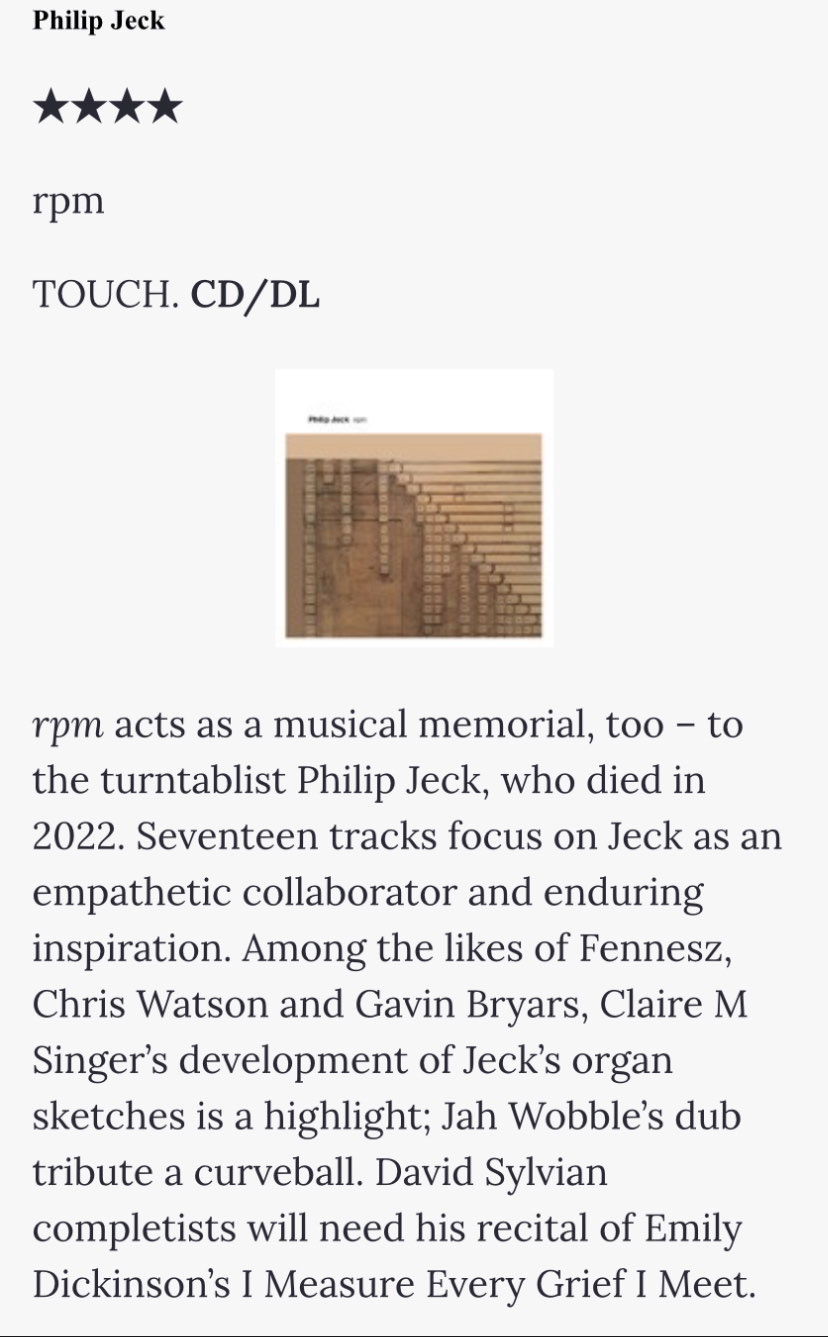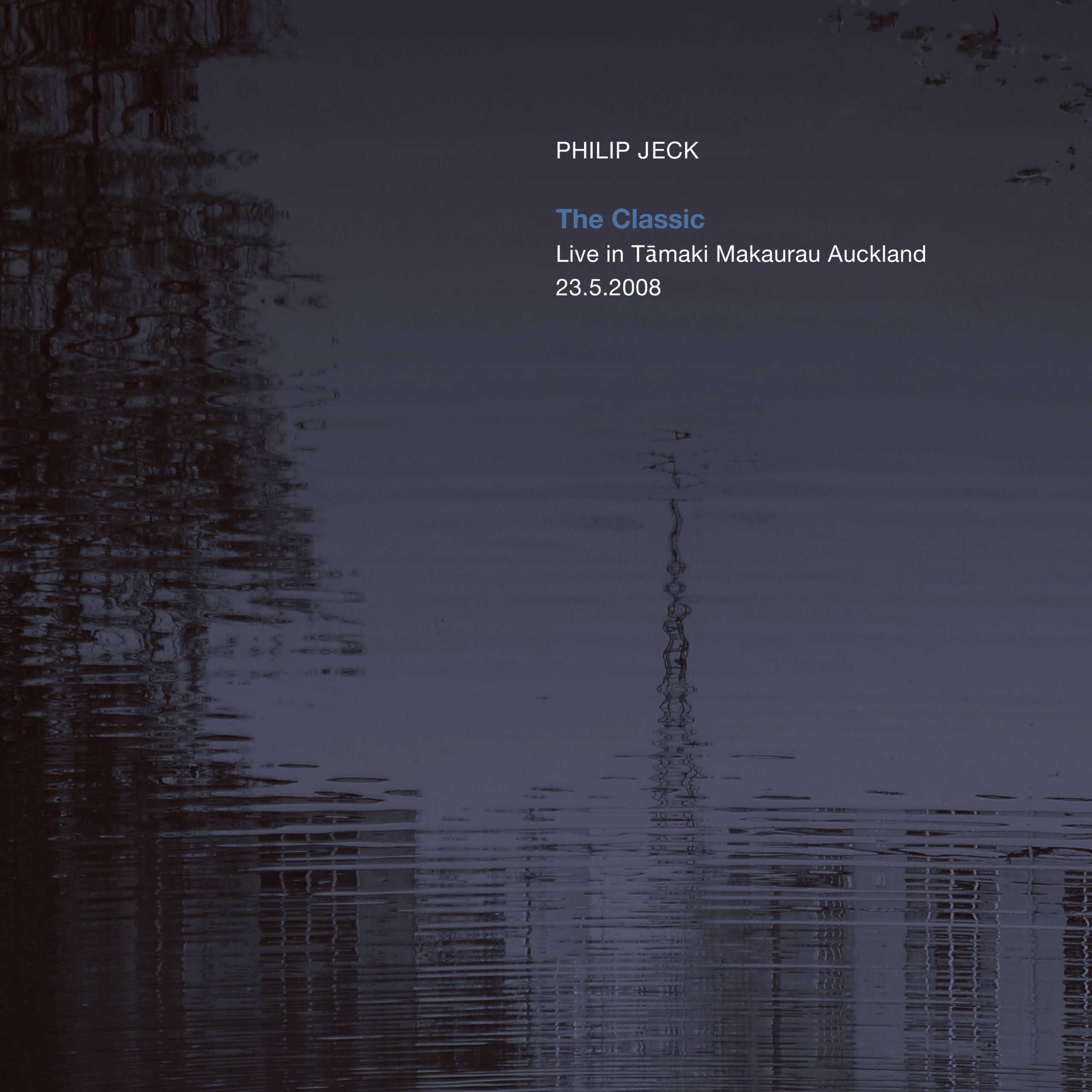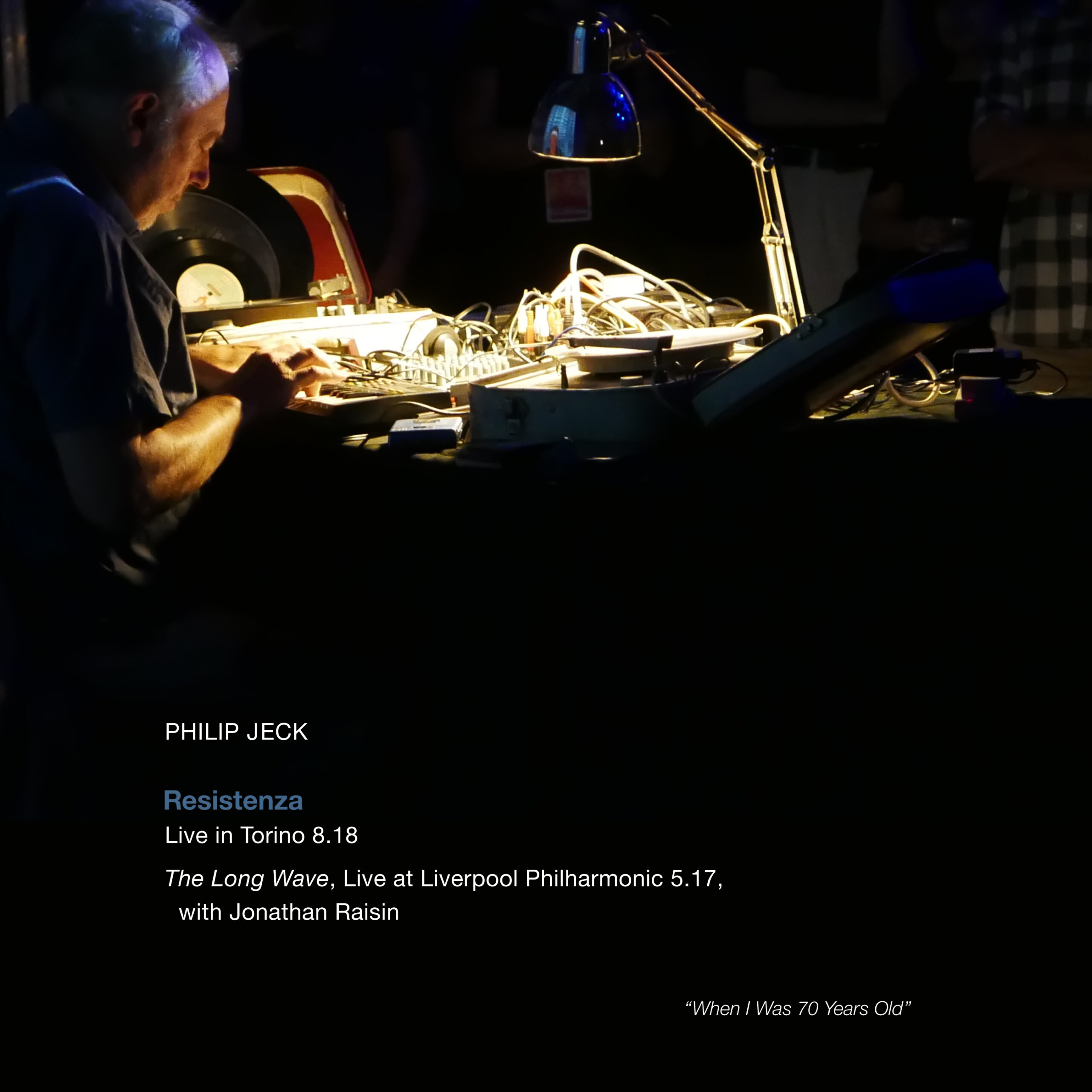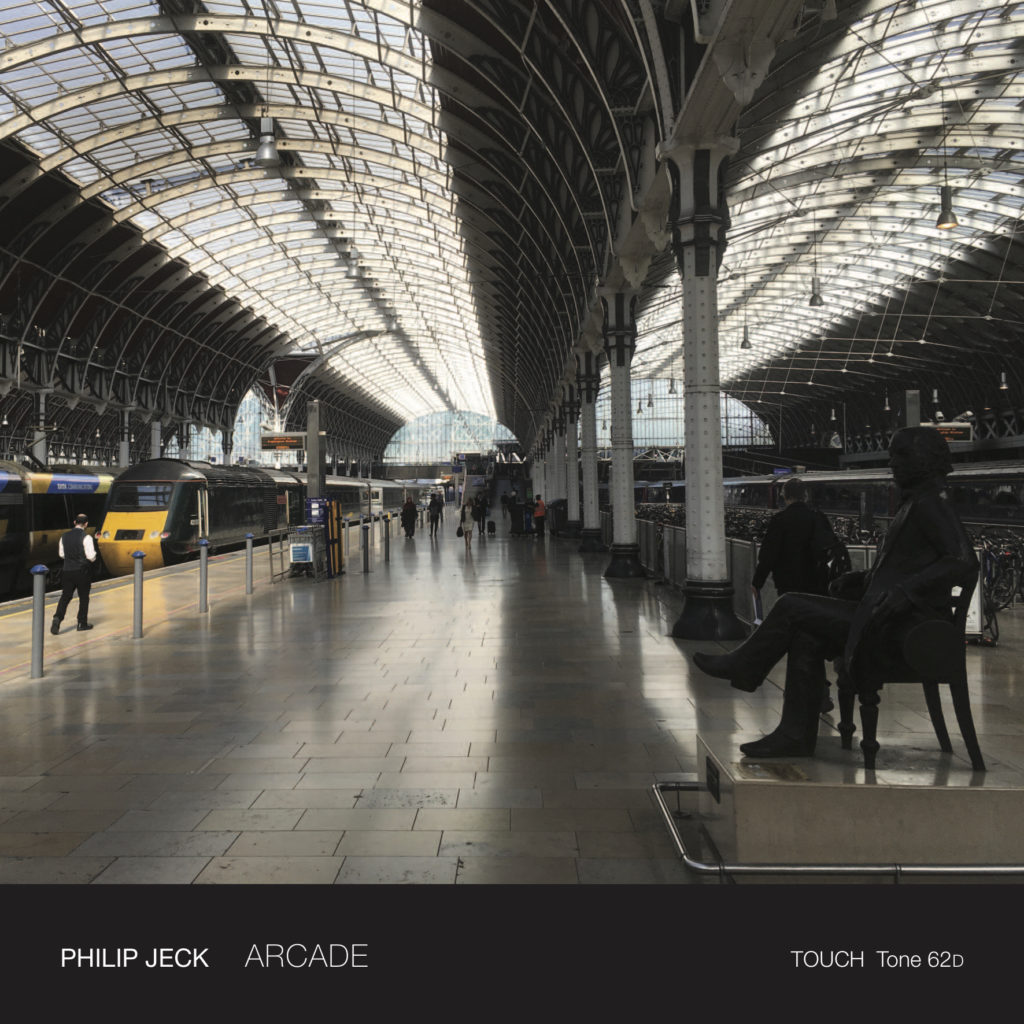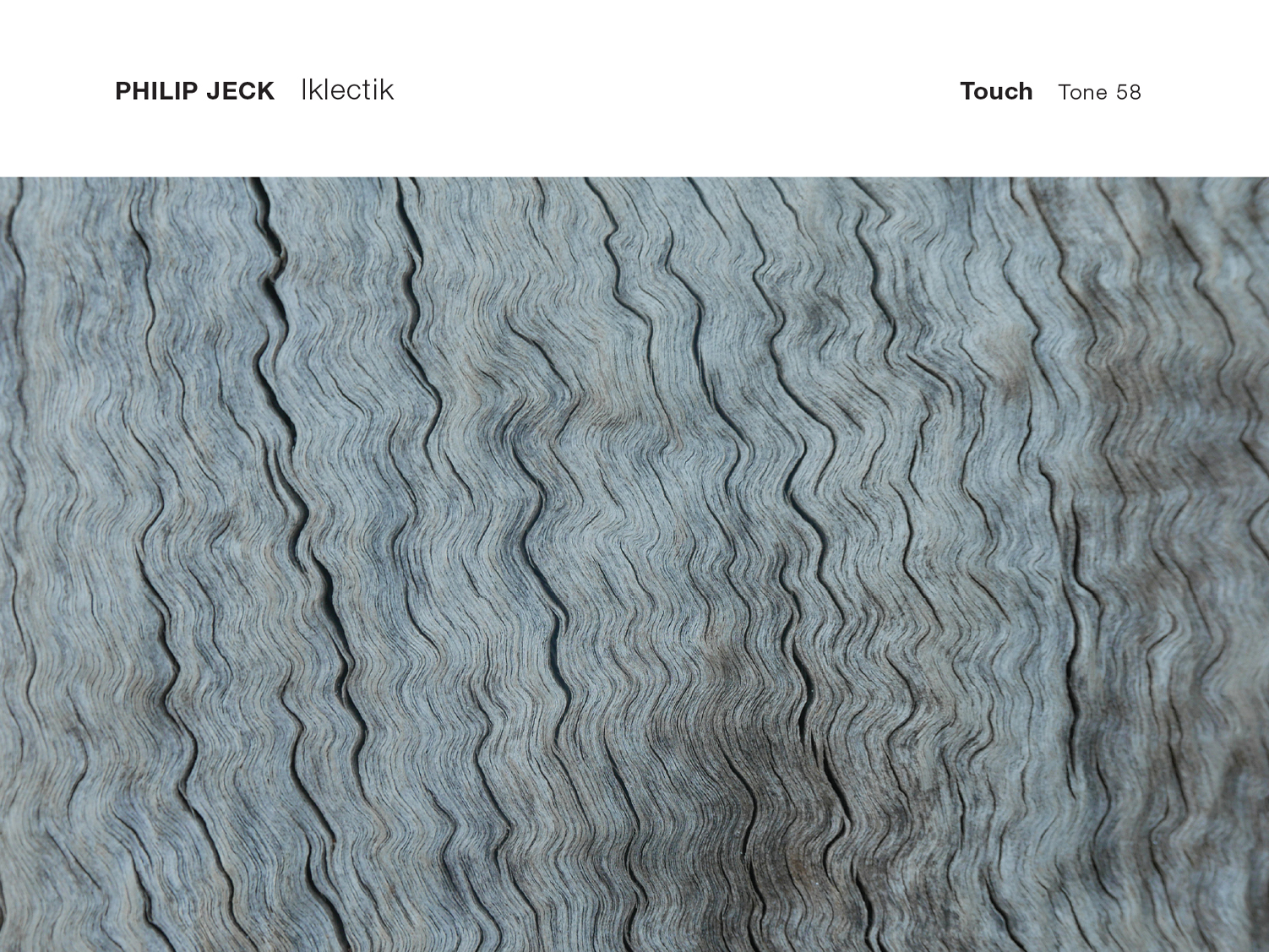Release date: 15th November 2024
Available to order now on Bandcamp
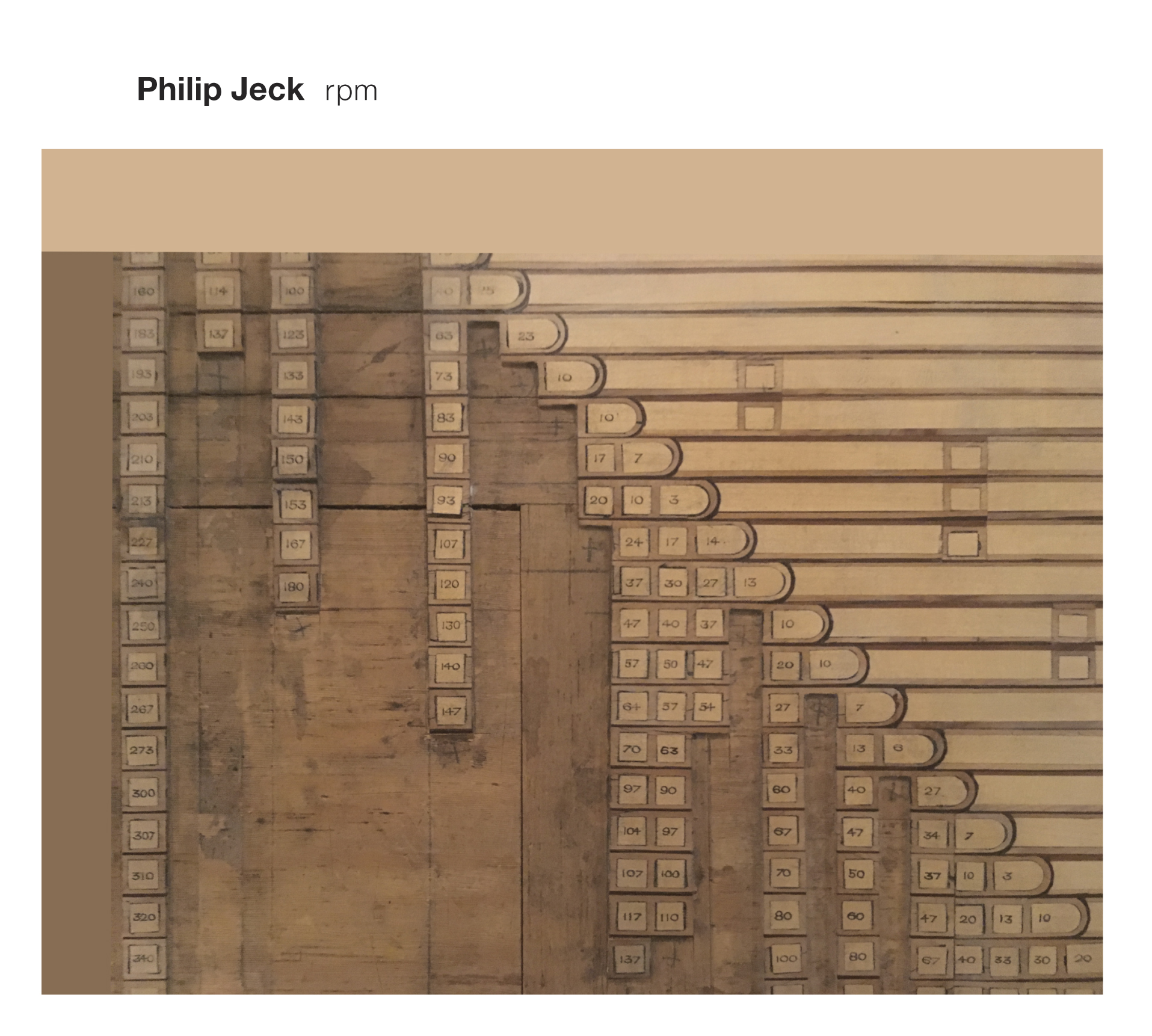
Track Listing: [DCD – 16 tracks]
CD1
1. Fennesz – Dancer
2. Gavin Bryars & Philip Jeck – 1 Piste
3. Chris Watson – Saltmarshe Station
4. Rosy Parlane – Stoked
5. Cris Cheek – Clocking Off
6. Claire M Singer & Philip Jeck – Sketch One
7. Gavin Bryars & Philip Jeck – 4 Piste
8. Faith Coloccia – Pleione
CD2
1. Philip Jeck – Mono
2. David Sylvian & Hildur Guðnadóttir – I Measure Every Grief I Meet
3. Claire M Singer & Philip Jeck – Sketch Two
4. Jah Wobble & Deep Space – Jeck, Drums, 2 Basses
5. Drums Off Chaos – Keep in Touch
6. Gavin Bryars & Philip Jeck – 8 Piste
7. Chandra Shukla – The Ark Has Closed
8. Jana Winderen & Philip Jeck – Pilots
With rpm, we wanted to join some of the dots of Philip’s life and involve many other collaborators, early and more recent. Fennesz was a friend and kindred spirit on the same label. Claire M Singer formed a new chemistry and partnership and although their plans must now take a different form, Mary found some sketches Philip had laid out using Claire’s organ recordings, for further development. Faith Coloccia & Philip had already released Stardust on Touch in 2021. Their live performance together at 2220arts + archives, Los Angeles in March 2022 celebrating Touch’s 40th anniversary had to be shelved. And in September of that year Iklectik hosted a memorable tribute night with live work from Chris Watson, Liverpool Improvisation Collective, Claire M Singer and others – most of all a dedicated audience who knew and felt that this was a future event and not the end of the story.
A work in progress at the time of Philip’s death, Oxmardyke, a project with Chris Watson, saw the light of day as Touch Tone 83 in early 2023 – working on recordings Chris had sent, Philip with laptop perched on hospital bed, almost to the end. There were other artists who wanted to actively contribute further, whether in performance or contributing to this album: Jana Winderen had already sent Philip her recordings of pilot whales and the track you hear was finished in March 2022. Cris Cheek was in Slant with Philip and Sianed Jones, who also sadly left us that same year – their work together predates Philip’s with Touch. Philip owed much in his early years of composing and playing to his collaboration with dancers, theatre and film makers – in particular, a 10 year working and performing partnership with Laurie Booth, Yip Yip Mix and the 20th Century, which toured widely during the 1980s and early 90s. An early audio visual work, Vinyl Requiem (1993) was created with visual artist Lol Sargent, using 180 record players, nine slide projectors and two 16mm projectors producing a live performance on a huge scale. Vinyl Requiem wasn’t exactly about the end of vinyl, but the dawn of some- thing else regarding sound recording and music. It was never a final statement but a testament to the work to come.
Compiled & edited by Mary Prestidge, Mike Harding & Jon Wozencroft
Photography & design by Jon Wozencroft
Mastered by Denis Blackham
For more information, you can visit his website here
Reviews:
A Closer Listen (USA):
Top Ten Experimental Albums of 2024
rpm is an incredible collection, a sonic eulogy for a fallen composer. The double album includes contributions and collaborations with friends, some of which had been planned or unfinished at the time of his death. But of course Jeck’s work is the unifying factor, his brilliance shining through every piece. Gone but not forgotten, Jeck was an originator and a trail blazer, and his influence is heard throughout the industry. A huge congratulations to Touch for this indelible tribute, a gathering of like-minded artists, generous in length and in love. [Richard Allen]
and #14 in the 2024 chart
A collaboration with Chris Watson, last year’s Oxmardyke (which also made our Top 20 list) seemed to be the last work of a great experimenter, Philip Jeck. This year’s rpm is a Festschrift of sorts – a volume of dedications, reworkings, and collaborations that sees an impressive roster of sonic investigators clustering around Jeck’s memory. A master of the turntable, the loop, the manipulation of prerecorded sound, Jeck spent much of his career navigating the complexities and possibilities of memory – which can be tactile, audible, psychological, or otherwise. It is impossible to discern the boundaries between Jeck, the various source materials, the hardware, and the collaborators/commemorators on this album. Of course, that’s part of the beauty. Here we celebrate the ephemeral and transitory nature, not just of sound and media, but of human life itself. [Samuel Rogers]
Ambientblog (net):
Philip Jeck, who passed away in 2022, will be remembered as the godfather of turntablism. He worked with old records and record players, playing them as musical instruments and thus creating a new kind of performance art. His ‘Vinyl Requiem’ (with Lol Sargent) used no less than 180 (!) record players – and won the Time Out Performance Award in 1993. He played and performed with many well-known artists such as Jah Wobble, Steve Lacy, Jaki Liebezeit, David Sylvian – and many, many more.
Touch, the label that released many of Jeck’s albums, now honors the artist with a 16-track double CD of his music in collaboration with an impressive array of artists: Fennesz, Gavin Bryars, Chris Watson, Rosy Parlane, Cris Cheek, Claire M Singer, Faith Coloccia, David Sylvian & Hildur Guðnadóttir, Jah Wobble & Deep Space, Drums Off Chaos, Chandra Shukla, and Jana Winderen.
RPM is not a collection of remixes of precious tracks, but a selection of music these artists worked on with Philip Jeck during the last years of Jeck’s life. It is an ode to the versatility and diversity of his music, including restless turntablist loops, calm ambient dronescapes, processed field recordings, dubby bass, and fierce rhythms. In working with so many different artists, Jeck proved himself a musical chameleon: each track is undeniably his, yet it unmistakably reflects the style of the artist he collaborates with.
By ‘joining some of the dots of Philip’s life and involving many other collaborators, early and more recent’, Touch created a monumental tribute to this unique artist. [Peter]
Bandcamp (USA):
The late, great Philip Jeck will be remembered most of all for his monumental works repurposing old records: Vinyl Requiem, Vinyl Coda, Surf, Stoke, and 7. But Jeck was an inveterate collaborator as well, working with forward-thinking musicians from all disciplines. His final album was 2023’s Oxmardyke with field recording legend Chris Watson, but at his passing he had several other projects underway as well. Rpm is a collection of these works in progress along with memorials from some of those closest to him. Among its songs are excellent field recording pieces: Watson appears again with a recording of a train station in the vein of their previous work together. Cris Cheek, his bandmate in Slant, shares what he calls a “domestic elegiac” for Jeck of sounds from an empty 1810 house. Jana Winderen had sent Jeck a recording of pilot whales for him to work with, and the unfinished track appears here. All these and much more are gathered in memory of Jeck, a fitting tribute to a generational talent and a touching reminder of how much work he still had left to do. [Matthew Blackwell]
salt peanuts* (SWE)
British Philip Jeck was an experimental turntablist-composer (1952-2022) who created a unique and personal musical language by playing old records and record players salvaged from junk shops as musical instruments. The double album rpm celebrates Jeck’s seminal work and connects the dots of his career with kindred spirits and close collaborators, including Fennesz, Gavin Bryars, David Sylvian & Hildur Guðnadóttir and Jah Wobble.
This album begins with the atmospheric-cinematic «Dancer» by Jeck’s friend, sound artist-guitarist-composer Christian Fennesz, who, like Jeck, releases his work via the Touch label. The suggestive pieces of Jeck with double bass player-contemporary composer Gavin Bryars stress the genre-defying spirit of his groundbreaking work. The pieces with sound artist Chris Watson, who focuses on natural history, are taken from a work in progress of him and Jeck, with Jeck and his laptop on a hospital bed, days before his death, completing his parts for Oxmardyke (Touch, 2023).
Sound artist Rosy Parlane contributed the melancholic, cinematic «Stoked». Sound poet Cris Cheek, who has worked with Jeck in the Slant trio with producer Sianed Jones at the end of the eighties and beginning of the nineties, composed the mournful and touching «Clocking Off». Electronics composer Claire M Singer planned a joint project with Jeck and began working on her meditative organ recordings, now presented as sketches for further development. Electronics player Faith Coloccia, who has worked with Jeck on Stardust (Touch, 2021), contributed the 15-minute, minimalist yet seductive «Pleione», titled after the Oceanid nymph in Greek mythology, the mother of the Pleiades. Jah Wobble, who collaborated with Jeck (on Wobble & Deep Space, Five Beat, and with Jaki Liebezeit, Live in Leuven, 30 Hertz, 2003 and 2005) contributed the rhythmic «Jeck, Drums, 2 Basses» from Five Beat, with drummer Mark Sanders. This vibe is expanded with the German collective Drums Off Chaos’ hypnotic «Keep in Touch» (with Liebezeit). «The Ark Has Closed» by electronics musician Chandra Shukla is an atmospheric soundscape.
Jeck’s only solo piece «Mono» corresponds with his influential work with visual artist Lol Sargent, Vinyl Requiem (Touch, 2013), where they used 180 record players, nine slide projectors and two 16mm projectors for a huge-scale, live performance that was not a real requiem but a testament to the work to come. David Sylvain, who collaborated with Jeck on his Uncommon Deities (Samdhisound, 2012), and cellist Hildur Guðnadóttir anchor the moving, emotional core of this compilation with Emily Dickinson’s poem «I Measure Every Grief I Meet» (Dickinson was one of Jeck’s favorite poets). This thoughtful compilation is concluded with «Pilots», sound artist Jana Winderen’s work with Jeck based on her recordings of pilot whales, and finished just a few days before Jeck’s passing. [Eyal Hareuveni]
MOJO (UK):
